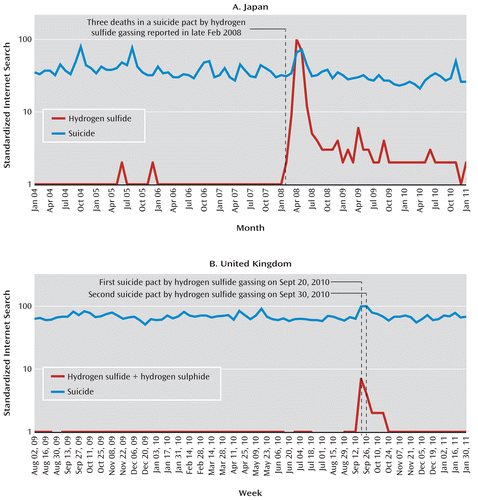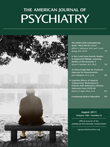Internet Searches for a Specific Suicide Method Follow Its High-Profile Media Coverage
To the Editor: Widespread media coverage of specific methods of suicide may lead to copycat deaths and could initiate changes in the popularity of particular methods. At-risk individuals may use the Internet to research particular methods of suicide (1, 2), and a person's choice of method can influence case fatality (3). However, there is little research into the impact of news reports of suicide on subsequent Internet search activity.
We investigated the effect of media coverage of suicides by hydrogen sulfide gassing on trends in Internet searches in two countries. In Japan, news reports of three deaths using this method in late February 2008 were followed by more than 200 hydrogen sulfide suicides during the subsequent 4 months (4). This epidemic was thought to be fueled by information on the Internet about making the gas. In the United Kingdom, extensive media coverage on September 20, 2010, of a suicide pact using this method was followed by a second hydrogen sulfide suicide pact within 10 days and another in February 2011.
We investigated search volume patterns from Google searches (http://www.google.com/insights/search) using the terms “suicide” and “hydrogen sulfide” (or “hydrogen sulphide”), filtering for Japan from January 2004 to January 2011 (Figure 1A) and for the United Kingdom from August 2009 to January 2011 (Figure 1B). The searches were performed in Japanese and English. Google provides a relative figure based on search activity for the study period but does not provide absolute numbers of searches. The month or week in the selected period with the highest number of searches is assigned the value 100, and other months/weeks are scaled accordingly.

FIGURE 1. Trends in Internet Searches Using the Terms “Suicide” and “Hydrogen Sulfide” (or “Hydrogen Sulphide”) on Google in Japan, January 2004–January 2011, and in the United Kingdom, August 2009–January 2011a
a The month or week with the highest number of searches is assigned the value 100, and other months/weeks are scaled accordingly.
In Japan, online searches for “hydrogen sulfide” increased 50 times in April 2008 after the initial media reports in February 2008, surpassing the search volume for “suicide” (Figure 1A). In the United Kingdom, the number of online searches for “hydrogen sulfide” did not increase as much as they did in Japan, but the searches nevertheless rose by more than nine times in the week of the suicide pact reports compared with the previous 4 weeks (Figure 1B). The search volume for “hydrogen sulfide” in this period was only 7.1% of that for “suicide,” which also increased by 57% in the week of the suicide pact reports compared with the previous 4 weeks.
These data suggest a striking impact of media coverage of an unusual method of suicide on Internet searches relating to that method. It is too early to determine whether differences in the relative changes in Internet searching between Japan and the United Kingdom, and likely cultural differences in attitudes toward suicidal behavior, will be reflected in the numbers of copycat suicides in the two countries, as U.K. suicide data for this period will not be available for 2 years. However, only two subsequent suicide pacts using hydrogen sulfide have been reported by the media in the United Kingdom, suggesting a smaller effect. The Internet may provide a real-time barometer of the impact of media reporting.
1. : Suicide methods from the Internet. Am J Psychiatry 2004; 161:1500–1501Link, Google Scholar
2. : Suicide and the Internet. BMJ 2008; 336:800–802Crossref, Medline, Google Scholar
3. : Lethality of suicide methods. Inj Prev 2008; 14:39–45Crossref, Medline, Google Scholar
4. : Japanese experience of hydrogen sulfide: the suicide craze in 2008. J Occup Med Toxicol 2010; 5:28Crossref, Medline, Google Scholar



